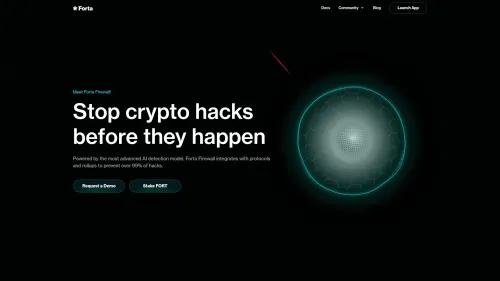Forta (FORT)
Forta was launched in early 2021, incubated by OpenZeppelin, a prominent risk management and blockchain security company. It received a $23 million investment led by Andreessen Horowitz. Key investors include Coinbase Ventures, Blockchain Capital, a16z, Blueyard, Placeholder, North Island Ventures, the Digital Currency Group, and OpenZeppelin. Forta aims to enhance decentralization by exploring a DAO model. In November 2021, Forta introduced the Forta App and Explorer to a global audience. At the beginning of 2022, governance responsibilities were transferred to the Forta Foundation, an independent non-profit organization. Since its inception, Forta has gained significant adoption and growth within the Web3 ecosystem.
Overview

| Ticker | FORT |
| Category | Artificial Intelligence (AI) |
| Website | https://forta.org/ |
| @FortaNetwork | |
| Contract Addresses | |
|---|---|
| ethereum | 0x41...29 Copied! Copied! |
| polygon-pos | 0x9f...e1 Copied! Copied! |
Forta is a decentralized network designed for real-time security and operational monitoring of blockchain activities. It provides alerts about the security and health of systems and protocols, enabling investors to respond to threats and minimize risks. The Forta Network monitors on-chain activity, identifying threats and significant events. This network comprises detection bots created by Web3 developers and security professionals, each focusing on specific on-chain elements. Some bots track general threats, such as phishing attacks, while others monitor protocol-specific activities.
Detection bots
Detection bots are surveillance tools created by developers and deployed on the network. The functionality of each bot is determined by its developer's logic. These bots vary in complexity, with some monitoring specific conditions and others using advanced heuristics and machine learning models. When a bot identifies certain criteria, it issues an alert. Developers must stake a minimum of 100 FORT tokens on each detection bot to prevent spam and ensure network integrity.
Scan nodes
Scan nodes are integral components of the network, similar to servers contributing capacity. They execute detection bots, supply blockchain data, and disseminate alerts. Users can operate scan nodes by staking FORT tokens. Each scan node monitors blocks and transactions, supporting EVM blockchains like Ethereum, Polygon, and BNB Chain. New bots are randomly assigned to scan nodes and begin running shortly afterward. Scan nodes collect alerts reported by detection bots and publish them. Each scan node must be staked with a minimum of 2,500 FORT tokens.
Network intelligence
Forta's detection bots generate alerts and data points regularly. Users can subscribe to alerts from specific detection bots using the Forta App, browse the latest alerts, and query alerts using the Forta API to integrate them into their applications.
FORT Token
FORT is an ERC-20 token on the Ethereum network and serves as the native token of Forta. The token incentivizes securing Forta's monitoring network, supporting its growth and security in the Web3 ecosystem. Forta adopts a work token model, requiring both scan node pools and detection bots to have FORT staked above a minimum requirement. This mechanism ensures economic security, as stakes can be slashed for malicious actions.
Use cases
FORT has several use cases:
- Scanner pool staking: Owners of scanner pools deposit FORT tokens to secure their contributions. Staked FORT can be slashed for non-performance or malicious behavior. Delegators can also stake on a pool, with similar withdrawal restrictions.
- Detection bot staking: Developers stake FORT tokens on bots to signal quality and enhance network integrity.
- Payment of data fees: Users pay a monthly fee in FORT for data consumption on Forta's General Plan. Premium feeds may be settled in FORT or USDC.
Token distribution
The total supply of FORT tokens is capped at 1,000,000,000. The distribution includes:
- Community allocation: Managed by the Forta Foundation without a specific vesting schedule.
- Backers: Early supporters provided funding and became initial node operators, with transfer restrictions enforced through on-chain vesting.
- Initial core contributors: Developed by OpenZeppelin, with a 20% allocation subject to a 4-year vesting period.
- OpenZeppelin: Allocated 10% of the token supply, subject to a 4-year vesting period.
Governance
The Forta Foundation, a non-profit organization, manages assets such as intellectual property and FORT tokens. It facilitates governance by community members. The governance framework consists of the Forta Proposal Process and the Forta Governance Council.
Forta proposal process
The Forta Proposal Process (FPP) provides a formal framework for community contributions to the network's development. Governance-related discussions occur in the Forta Forum.
Forta governance council
The Forta Governance Council oversees the network's development, facilitating collective community action. Composed of early community members and experts, the council is elected through FORT token holder votes. The council simplifies governance, reducing voter fatigue. Community members can propose changes or signal support by voting with FORT tokens.
The council's governance authority includes supporting Forta's growth, facilitating network development, enabling security programs, educating the Web3 ecosystem, and building community initiatives. Decisions are made by majority vote, with mechanisms in place for community input and accountability.
Members
The current Forta Governance Council members, elected on June 5, 2022, are:
- Demian Brener - Founder & CEO at OpenZeppelin
- Hart Lambur - Co-Founder at UMA
- Jeremy Sklaroff - General Counsel at Celestia
- Jonathan Alexander - CTO at OpenZeppelin
- Juan Garre - Director at the Forta Foundation
- Mat Travizano - Founder at Rewilder
- Tomasz Stańczak - Founder at Nethermind
